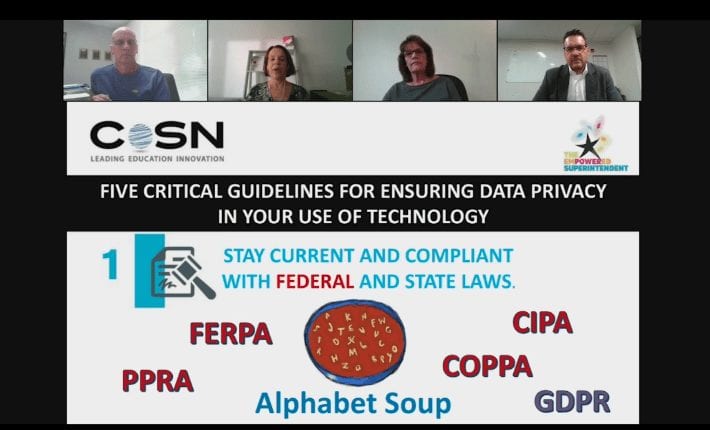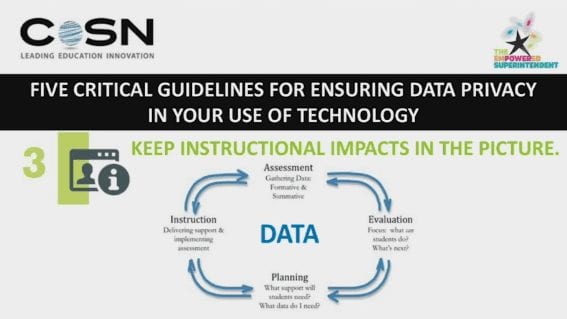The Keys to Discussing Student Data Privacy
Despite universal concerns about student data privacy, communicating school policies can quickly overwhelm school leaders. CoSN has stepped in with guidance for superintendents and principals to help them with several aspects of student data privacy, including best practices for informing the community. In their edWebinar “Assuring Student Data Privacy: Lessons for Our Times,” presenters offered insights into how school leaders can take charge of communications for this critical issue.
First, in the United States the mixture of federal laws (FERPA, COPA, etc.) with an overlay of state and local laws makes understanding privacy regulations difficult at every level of education. Most districts have a team dedicated to understanding the complexity of the laws, but school leaders must also make sure that every employee has a job-appropriate understanding of the regulations. When writing policies, rather than restating the laws and all the legal jargon, administrators need to ask themselves what each group needs to know, and what do they need to do. Then, write policies that help each group enact the laws. For example, teachers most likely know they can’t just download an app and start using it with their students. But rather than the policy restating it, the policy should have the procedure teachers need to follow to get approval.
And, administrators shouldn’t neglect privacy training for non-classroom staff. Coaches, for instance, might have sensitive health information, and clerical staff input student data constantly. In addition to annual school-wide professional development about the policies, schools need job-specific sessions for each subgroup.
Next, schools need to develop that same training for parents. Parents, said Andrew Moore, CIO, Boulder Valley School District, CO, generally fall into two camps: those that want minimal tech use and wish the classroom looked the same as it did 20-30 years ago, and those that see tech as essential to their child’s education and future. Balancing those perspectives in conjunction with instructional needs is essential. Linnette Attai, Project Director, CoSN Privacy Initiative and Trusted Learning Environment Program, suggested that administrators ask the same questions of parents that they did of their employees: what do the parents know, and what do they need to know? Then, start with the basics. Communicate to parents why you have the policy, what protections you’re putting in place, and how they will help the students.
Educating the community about your school’s data privacy policies is also important when they start comparing your district’s curricula to another. One district could have stricter privacy rules than another, which means that some programs may raise the red flag for them while other schools find the risks acceptable. Administrators must stay focused on their policies and their reasons and continually share them with their constituents. Keep the conversation centered on how you’re helping the students rather than what educational tool someone else uses.
And even when a program meets a school’s privacy standards, it may not be an effective education tool for its students. Be clear with parents, students, and teachers why a resource isn’t being used at your school—whether it’s due to privacy concerns or another issue—so that they feel like a part of the conversation.
Finally, continually emphasize that privacy protection is a shared duty. “We’re all responsible,” said Moore. “It’s not an IT issue. It’s all of our issue to make sure we’re not letting data leak out or that we’re not sharing data inappropriately.”
This edWeb broadcast was co-hosted by CoSN and edWeb.net and sponsored by ClassLink.
This article was modified and published by EdScoop.
About the Presenters
Dr. Chris Gaines is Superintendent of Mehlville School District in suburban St. Louis. Dr. Gaines previously served as superintendent of Missouri’s Crawford County R-I and Wright City R-II school districts. Under Dr. Gaines’ leadership, Mehlville is expanding opportunities for students. In 2017 the district opened MOSAIC, a personalized learning elementary school, and created the MyPath program, which allows high school students to create their own class. The AASA Digital Consortium visited these programs in the spring of 2018 to gain insight into emerging models of best practices using digital media to support engaging learning experiences. This year Mehlville opened academies at each middle school to expand personalized learning experiences at the middle school level. Dr. Gaines holds degrees from Southeast Missouri State University and earned his doctorate at St. Louis University. He is a member of numerous professional associations and served as the 2018-2019 President of AASA, The School Superintendents Association.
Andrew Moore is the CIO for Boulder Valley School District in Colorado where he provides IT services for 4,200 employees and 30,000 students. His focus on eliminating the homework gap, staying vigilant on cybersecurity and student data privacy guides his decision making on policy and programs in the school district. Before joining the Boulder Valley School District, Andrew was a Sr. Director at Sun Microsystems responsible for a global IT team. He developed his government experience during three terms as Mayor of the Town of Erie, a 20,000 person suburb of Boulder. Andrew holds degrees in computer science and sociology, is a certified Six Sigma professional, and is an MBA candidate at CU Denver in 2020.
Linnette Attai is Project Director for CoSN’s Privacy Initiative and Trusted Learning Environment Program. For over 25 years, Linnette has been building organizational cultures of compliance and guiding clients through the complex obligations governing data privacy, user safety, and ethical marketing, with a focus on the education and youth sectors. As founder of the global compliance consulting firm PlayWell, LLC, Linnette advises organizations, educators, lawmakers, and policy influencers. She serves as Virtual Chief Privacy officer and data protection officer to select clients, and speaks nationally on data privacy matters. Linnette is a member of the Rutgers Center for Innovation cybersecurity advisory board, and author of Student Data Privacy: Building a School Compliance Program.
About the Host
Ann McMullan is Project Director for CoSN’s Empowered Superintendents Initiative. Ann served as Executive Director, Educational Technology in the Klein Independent School District, near Houston, Texas until September 2013, when she and her family moved to Los Angeles, California. For 16 years Ann led the district team that provided professional development on technology and 21st century instructional strategies to 4,000 professional educators serving 50,000 students. Ann served as co-chair of Texas Education Technology Advisory Committee which developed the Texas Long Range Plan for Technology, 2006-2020. Today, Ann is based in Los Angeles working as a public speaker, writer, and education consultant focused on leadership and planning to meet the needs of today’s students. Ann serves on the Project Tomorrow advisory council and is a leadership consultant with Executive Service Corps of Southern California, serving non-profit associations. Ann co-authored Life Lessons in Leadership, a guide for leaders ages eight to 88.
Join the Community
Super-Connected is a free professional learning community on edWeb.net for school superintendents, district leadership, and aspiring district leaders.







Comments are closed.